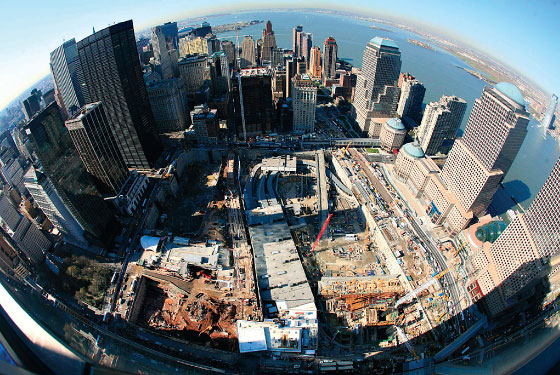
Last week, in a refreshing outburst of candor, the Port Authority acknowledged that rebuilding the World Trade Center site would require more years and more billions of dollars than previous wishful thinking had allowed. The report, which coldly identified problems while studiously declining to assign blame, suggested that what the project needs now is logistical leadership—a “traffic cop” to coordinate the snarl of public agencies, private developers, contractors, architects, and consultants on the site. Shortsightedness, small-mindedness, venality, and ego have already laid waste to so many wonderful ideas here. To recover our collective honor requires a moral leader as well as a logistical one—someone empowered to weigh vision against pragmatism, fiscal prudence against public good. That person must be able to decide and explain which parts of the plan are fantasy and which are nonnegotiable.
In the first category is the performing-arts center, which has no tenant, no client, no specific purpose, no timetable, no design, and no budget. The honest thing for a new traffic cop–high priest to say about this building is that maybe it will happen someday, but that its architect, the 79-year-old Frank Gehry, might have to miss the ribbon-cutting. But in the other category is Santiago Calatrava’s Transit Hub, an ungainly name for a beautiful design that looks increasingly threatened. (The first concrete response to the Port Authority’s new realism campaign was to scrap its moving roof.) From the beginning, his airy assemblage of white steel bones was the only part of the plan that almost everybody loved. It remains essential.
So who could do this? One possible candidate would be Philippe de Montebello, the retiring director of the Metropolitan Museum. His legacy is already secure, so he has nothing to prove. He has construction experience, having eked improbable amounts of exhibition acreage out of the Met’s tight envelope. He showed diplomatic finesse in negotiating with Italian authorities over the return of illegally exported artworks. He has a finely honed aesthetic sensibility (and once even mounted an exhibit of Calatrava’s designs). Most important, he has spent decades acting on the belief that pandering to the public is a terrible way to serve it. Appointing him knight of ground zero would signal that this is a civic enterprise, one that can still be redeemed.
Have good intel? Send tips to intel@nymag.com.
